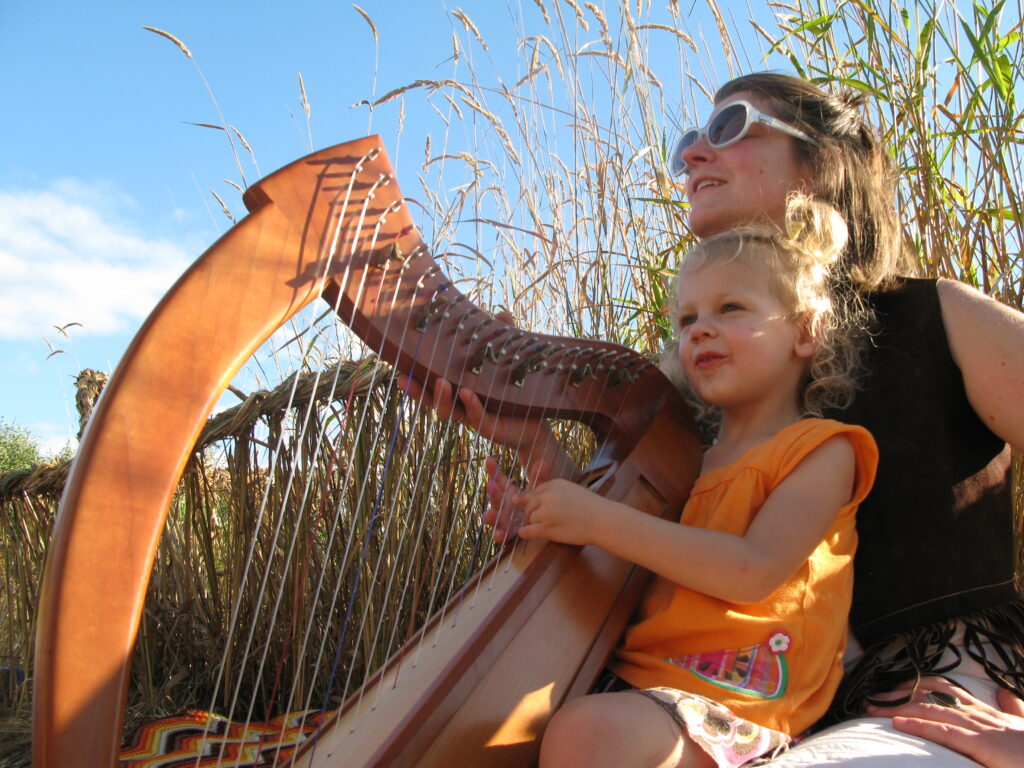We come to rituals to commemorate a moment in time, an event, or a loved one: a birth, love, a death. Often music plays a part in these rituals. Harp music in particular can be a meaningful addition to any ceremony. My work playing music for several decades at rites of passage and ceremonies of all sorts has given me a unique perspective on the process of ritual.
I have played harp since 1990, and I have been studying music earlier than that. As a young Catholic child, I was introduced to many ceremonies of the church – for holidays, feast days, seasons of the year, and of course, various passages of human life: birth, graduation, marriage, anniversary, and death. Since then, I would guess I’ve played music for nearly 600 weddings, and 500 funerals, memorials, and vigils.

Often, when music is a part of a reverent ceremony, it is a service, rather than entertainment. For instance, when I worked for Providence Hospice as a complementary therapist, I played harp for clients whose life might be on the threshold of death at any minute. There are certain styles and sounds that are most effective at this time. Sometimes my client didn’t have any loved ones present, so the gift of music meant all the more to them.
Music has played a part in ritual and ceremony perhaps as long as it has existed. I think one of the reasons why music has been used for centuries in ritual, is because it makes us feel good! Modern medicine can tell us many statistics citing music’s benefits, like this recent study done by the National Institute of Health (NIH). Benefits of music to our health and well-being are many faceted.
In my own life, I have benefited from music’s therapeutic effects during the natural childbirths of my two children. In fact, in combination with powers of the mind and taking care of my physical health, music’s profound effect on diminishing my labor pains, was one of the reasons why I became a Certified Clinical Musician. I wanted to share this positive experience by offering music in medical settings to others.
Some of the most beneficial responses to our well-being from therapeutic music can be: relief from pain, depression, and anxiety. Research by the NIH shows positive effects of music for people suffering from cancer, autism, Parkinson’s Disease, fibromyalgia, chronic obstructive pulmonary disease, multiple sclerosis, schizophrenia, and helping babies who are premature.
Music adds meaning to ceremony. It can sooth nervous energy. Regarding love, I tell wedding clients that a quiet moment in the ceremony can be savored by a musical interlude. Quiet rituals (communion, private vows, hand-fasting) can be enhanced with music. And if the idea is only to get married once, then we want this sweet moment in time to last! (What better way through song?)

For newborns, lullabies are obviously appreciated. As the child grows, the playful songs enjoyed by generations have their place at daytime. I have played music for birthday parties (including my own children’s) and baptismal ceremonies from traditional the Jewish bris, to Pagan blessings.
The harp is so versatile in this regard: it can be festive, celebratory, and yet soothing, calming, peaceful, and romantic. I feel very fortunate to have the harp in my life and to share this gift of beautiful music with others. If you need music for your ritual, consider harp music.